Rabbinic Age
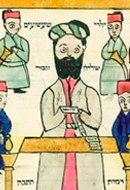 Go to Ammon and Moab
Go to Ammon and MoabMonday, February 25, 2013 by Daniel Gordis | Jewish Ideas Daily » Daily Features
Imagining themselves to be the wise men consulted on Vashti’s fate, the Rabbis deferred to the Jews’ enemies, saying, “from the day when we were exiled from our land, wisdom has been taken from us."
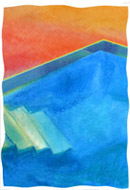 Opening the Gates of Judaism
Opening the Gates of JudaismWednesday, February 20, 2013 by Motti Inbari | Jewish Ideas Daily » Daily Features
Given the demographic and spiritual decline among “biological” Jews in America, if we want to keep Judaism alive, we must do something that we haven't done for 2000 years: proselytize.
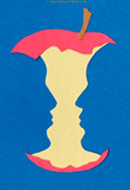 Make Yourself a Teacher
Make Yourself a TeacherTuesday, March 27, 2012 by Yehudah Mirsky | Jewish Ideas Daily » Daily Features
The meanings of "Torah" are inexhaustible, but its plainest sense is "teaching." It does not exist apart from being communicated. That circulation between human beings, and between humans and God, both gives Torah life and teaches us that Torah itself teaches life.
 Hitting the Jackpot
Hitting the JackpotThursday, March 8, 2012 by Micah Stein | Jewish Ideas Daily » Daily Features
Who doesn't like Purim? Besides the costumes and candy, the story itself has all the politics, sex, and violence of a juicy HBO series. In case you missed it: "Haman the son of Hammedatha, the Agagite, the enemy of all the Jews, had plotted to destroy the Jews, and had cast a pur—that is, a lottery—with intent to crush and exterminate them."
 Jewish Ethics, from Ancient Bible to Modern Bus
Jewish Ethics, from Ancient Bible to Modern BusMonday, February 13, 2012 by Lawrence Grossman | Jewish Ideas Daily » Daily Features
The next time someone tells you that ethical behavior doesn't need a foundation in religious teaching, step onto an Israeli bus (it doesn't have to be the gender-segregated variety) or open a mass-circulation Israeli newspaper and see how religion puts Jewish ethics on steroids.
 From New Year to Arbor Day
From New Year to Arbor DayWednesday, February 8, 2012 by Moshe Sokolow | Jewish Ideas Daily » Daily Features
The holiday of Tu Bishvat ("the fifteenth of Shvat") falls this year on Wednesday, February 8. What are its origins, and when and why did it become incorporated into the calendar as the Jewish "Arbor Day"?
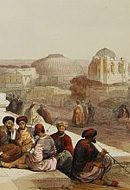 Jerusalem’s Ego and Id
Jerusalem’s Ego and IdThursday, January 19, 2012 by Alex Joffe | Jewish Ideas Daily » Daily Features
Biography is not the same as history. Biography charts the outer and inner life of a person—character, spirit, morality, emotion, perhaps even soul. History, by contrast, incorporates different narratives and pieces of evidence, seeks out new data, then rises above all the fragments with a synthesis.
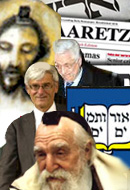 Highlights of 2011:
Highlights of 2011:Part II
Friday, December 30, 2011 | Jewish Ideas Daily » Daily Features
Part II of our round-up of the past year's most popular features on Jewish Ideas Daily. (Part I is here.)
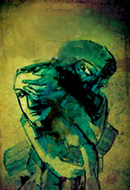 The Evil Inclination
The Evil InclinationMonday, December 5, 2011 by Raphael Magarik | Jewish Ideas Daily » Daily Features
The yetzer hara, usually translated "evil impulse," is an elusive rabbinic concept. The words derive from God's observation in Genesis 8:21 (paralleled earlier in 6:5) that "the imagination of man's heart is evil from his youth."
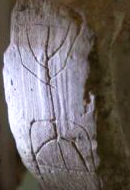 Mysteries of the Menorah
Mysteries of the MenorahThursday, September 8, 2011 by Meir Soloveichik | Jewish Ideas Daily » Daily Features
On the eve of Tisha b'Av, 2011, archeologists revealed artifacts newly unearthed from the great Jewish revolt against Rome (67–70 C.E.), including coins minted by the rebels and a stone incised with a sketch of the Temple menorah. But what is the menorah, and what does it symbolize?
Editors' Picks
When Rabbis Spoke Greek Nicholas De Lange, Marginalia. Scholars of rabbinics claim that "there is no trace of the Septuagint in the Judaism that we know from history." But new research shows otherwise.
Halakhic Spring Alex Israel, Thinking Israel. The backlash from Orthodox Jews against kashrut authorities in Jerusalem is a microcosm of a global phenomenon, whereby educated laymen are gaining the confidence to subvert rabbinic authority.
What a Friend We Have in Jesus Paula Fredriksen, Jewish Review of Books. Until very recently, scholarly work on the Jewishness of Christianity has been a largely Christian project, but over the past fifty years, in ever-larger numbers, Jewish scholars have joined in.
The Original Kosher Jesus Fred MacDowell, On the Main Line. 150 years ago, Rabbi Elias Soloweyczk published commentaries on Matthew and Mark, aimed not at rejecting the Gospels but showing their concordance with the Talmud.
Are You a Hellenist? Gil Student, Torah Musings. Is a contemporary acculturated American ignoring the main theme of Hanukkah? And for that matter, how did Maimonides reconcile his devotion to Greek philosophy with the ostensible message to reject Greek ideas?
Choose Your Poison Philologos, Forward. Why do some say l'chaim when blessing wine: to confirm that the drink hasn't been poisoned, to dispel grim associations, or simply to make sure that all present are ready for the blessing?
Marriage and Morals Shlomo Brody, Jerusalem Post. While the Torah explicitly commands Jews to procreate, it never definitively demands marriage. That being the case, does Jewish law ever permit extramarital sex?
Changing Jewish Liturgy Aryeh A. Frimer, Torah Musings. Over the millennia, changes to Jewish prayers have been introduced by printing errors, or forced upon Jews by censors. Now, changes are proposed to correct an "androcentric bias."
What's in a (Jewish) Name? Shai Secunda, Talmud Blog. Hunting for baby names, one Talmud scholar riffles through a lexicon of Jewish names in antiquity.
Hitting Bedrock Nadav Shragai, Israel Hayom. Two-thousand years after Herod's builders laid them, the foundation stones of the ancient Temple of Jerusalem have at last been uncovered.

